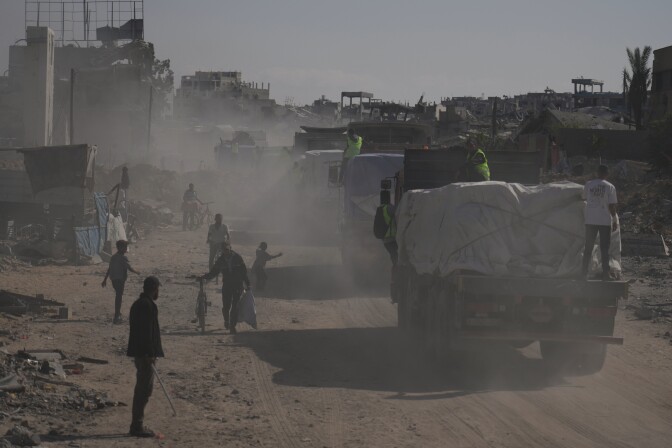AMMAN, Jordan — Israel, having banned the United Nations aid agency for Palestinian refugees from sending aid and staff to Gaza, is now taking unprecedented steps to de-register major nongovernmental aid groups for ideological reasons, according to several officials of humanitarian organizations.
They say the new rules threaten the ability of some of the biggest international nongovernmental organizations — known as INGOs — to send in aid or staff to both Gaza and the Israeli-occupied West Bank.
"INGOs are in limbo — most who have submitted have either been not accepted or rejected," an official with an aid organization that is aware of the situation said of the application process required for nongovernmental aid organizations operating in Gaza and the West Bank. The official spoke on the condition that NPR not name their employer and not give their name because they are not authorized to speak publicly.
The ceasefire agreement in the Gaza war brokered this month by President Trump committed Israel to a surge in aid into Gaza, where food security experts declared famine in parts of the territory. But Israel continues to severely restrict crossings open for aid shipments and who can send aid through them. Of seven Israeli border crossings with Gaza, only two are currently open. Of those that are open, the U.N. and nongovernmental aid groups say many requests to enter Gaza are routinely rejected, without explanation.
The Israeli military has claimed, without providing evidence, that its aid restrictions are needed for security.
Israel this fall began requiring that all international aid groups re-register under new criteria, including approval by a committee that includes representatives from Israel's Ministry for Diaspora Affairs and Combating Antisemitism.

Reasons for delisting aid groups include supporting "terrorist groups and activities in accordance with Israel law" and "inciting racism," according to COGAT, the Israeli military's arm that is part of NGO approval process. Aid organizations say the reasoning appears to be used to refer to a wide variety of comments the Israeli government classifies as antisemitic. Israel has in the past accused some aid groups and medical providers of being terrorist organizations.
Israel had also demanded that organizations provide personnel details for all local and international staff, a measure rejected by most major aid groups as potentially putting staff in danger.
The Norwegian Refugee Council, registered in Gaza since 2009, is one of the major aid groups unable to send in supplies or staff while its application is being considered.
"We quickly realized that the intent behind the process wasn't to facilitate the re-registration of humanitarian INGOs but rather to find a way to re-register us and to remove our ability to operate," says Ivan Karakashian, communications manager for the NRC in Jerusalem.
He says there were no clear guidelines as to what delegitimizing Israel included. Any de-registered organizations would have to cease operations in both Gaza and the Israeli occupied West Bank within 60 days, according to aid officials familiar with the criteria.
The Israeli military arm responsible for borders and coordination with INGO operations did not respond to NPR's requests for comment on reasons for de-registering or delaying registration of some organizations.
Many of those aid groups waiting to be re-registered have had hundreds of trucks waiting for months in Egypt and Jordan intended for Gaza.
Humanitarian officials said at least one major U.S.-based NGO has already been de-registered and is now in the appeal process. The organization in question declined to discuss the issue with NPR.
Another U.S.-based aid group, Mercy Corps, said following the ceasefire agreement, it had submitted a request to send in aid but it was denied by Israeli authorities because the organization was in the process of re-registering.
Humanitarian officials said Israel has approved a dozen NGOs that do not coordinate within traditional U.N.-led structures and are either ideologically driven or have little experience in humanitarian aid or both. They include one U.S. aid group that partnered with the controversial Gaza Humanitarian Foundation — a militarized aid response in which almost all other aid groups refused to participate.
COGAT did not respond to a request for comment on new aid organizations given registration.
At the same time, Israel continues to ban the U.N. agency for providing aid to Palestinian refugees, known as UNRWA, from sending in aid or staff to Gaza. Israel accused UNRWA, without evidence, of employing hundreds of Hamas members, including some involved in the Oct. 7, 2023, attack in Israel. It has sought since the start of the Gaza war to replace the U.N. aid system that has provided humanitarian assistance there for decades.
UNRWA, with 12,000 local staff, was the biggest humanitarian organization in Gaza, running shelters, mobile medical clinics, water and sanitation projects and schools.
"The warehouses in Jordan and Egypt are full of food that can feed the entire population of Gaza for three months and we need to bring that in," says Tamara Alrifai, UNRWA's director of external relations. The supplies also include medicine, tents, blankets and hygiene products.
Israeli airstrikes have damaged or destroyed more than 90% of homes in Gaza and most of the civilian infrastructure, according to U.N. figures.
The United States, which had been UNRWA's biggest donor, stopped its funding last year, which Alrifai says led to a loss of about one-quarter of UNRWA's total income. Alrifai says while European and other countries have increased their contributions, it does not fill the funding gap. The European Union's top humanitarian aid official said after the Israeli accusations against UNRWA he saw no evidence from Israel backing them.
Alrifai says UNRWA was trying to start discussions with the U.S. through other countries about renewing the funding.
"We have not had direct talks but we have passed on messages through other governments who are close to Gaza and close to the U.S.," she says.
Aya Batrawy contributed reporting from Dubai, United Arab Emirates.
Copyright 2025 NPR











